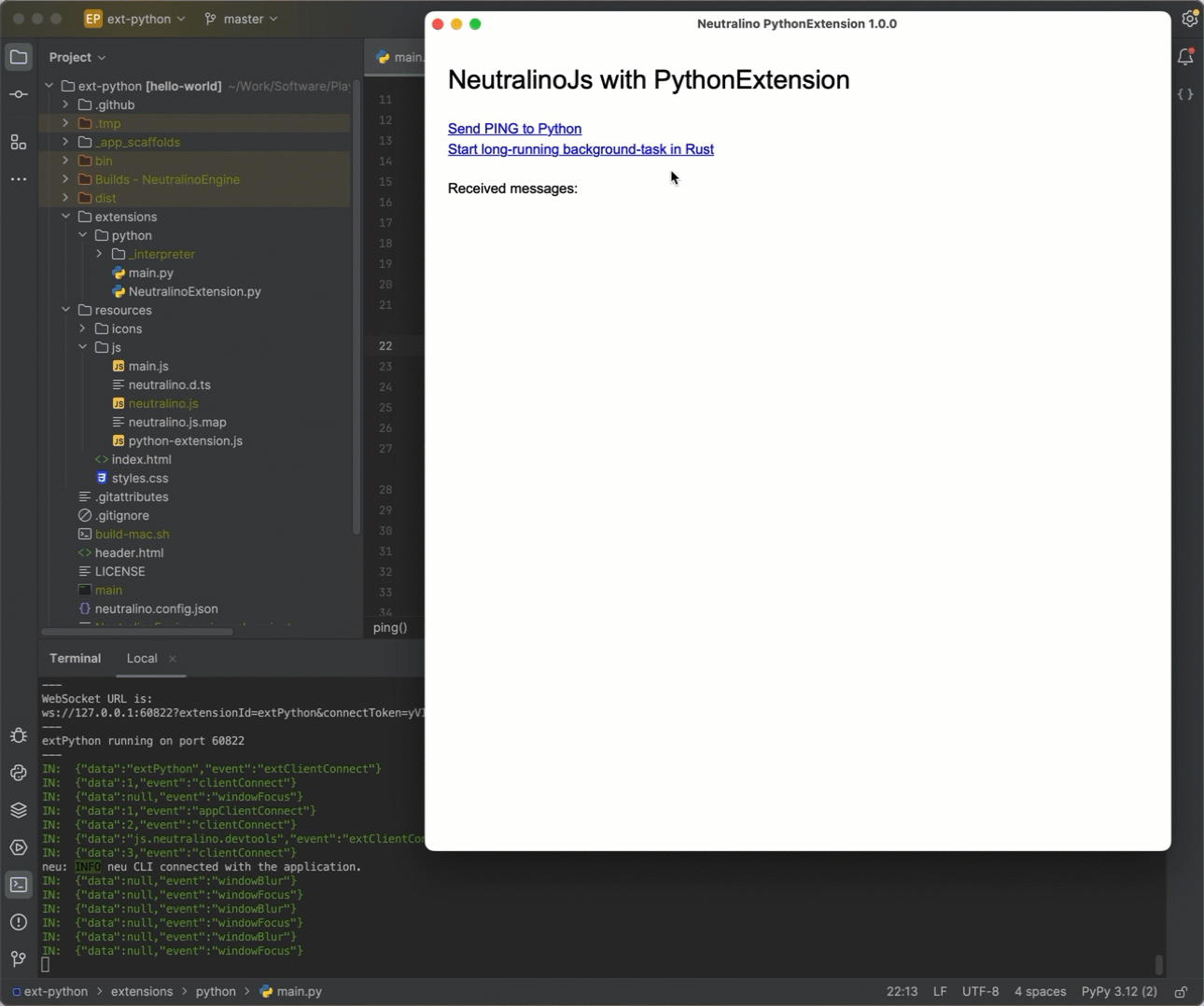A Python Extension for Neutralino
This extension adds a Python3 backend to Neutralino with the following features:
- Requires only a few lines of code on both ends.
- Read all events from the Neutralino app in your Python code.
- Run Python functions from Neutralino.
- Run Neutralino functions from Python.
- All communication between Neutralino and Python runs asynchronously.
- All events are queued, so none will be missed during processing.
- Track the data flow between Neutralino and Python in realtime.
- Works in Window- and headless Cloud-Mode.
- Terminates the Python interpreter when the Neutralino app quits.
The demo opens a Neutralino app. Clicking on the blue link sends a Ping to Python, which replies with Pong. This illustrates the data-flow in both directions.
Before running the demo, adapt the path to your Python interpreter in the neutralino.config.json file:
Replace this:
"extensions": [
{
"id": "extPython",
"commandDarwin": "${NL_PATH}/extensions/python/_interpreter/python3.framework/Versions/Current/bin/python3 ${NL_PATH}/extensions/python/main.py",
"commandWindows": "${NL_PATH}/extensions/python/_interpreter/pypy3/pypy.exe ${NL_PATH}/extensions/python/main.py"
}
]with e.g.
"extensions": [
{
"id": "extPython",
"commandDarwin": "python3 ${NL_PATH}/extensions/python/main.py",
"commandWindows": "python3 ${NL_PATH}/extensions/python/main.py"
}
]When including the extension in your own project, make sure that your config contains this whitelist:
"nativeAllowList": [
"app.*",
"os.*",
"window.*",
"events.*",
"extensions.*",
"debug.log"
],Next, prepare your Python environment with:
# python3 -m pip install --no-binary :all: websocket-client
After this, run these commands in the ext-python folder:
neu update
neu run
Just follow these steps:
- Modify neutralino.config.json, like mentioned in "Run the demo".
- Copy the extensions folder to your project.
- Adapt the Python code in extensions/python/main.py to your needs.
- Copy resources/js/python-extension.js to resources/js.
- Add
<script src="js/python-extension.js"></script>to your index.html - Add
const PYTHON = new PythonExtension(true)to your main.js - Add PYTHON.run(function_name, data) to main.js to run Python functions from Neutralino.
- Add event listeners to main.js, to fetch result data from Python.
from NeutralinoExtension import *
DEBUG = True # Print incoming event messages to the console
def ping(d):
#
# Send some data to the Neutralino app
ext.sendMessage('pingResult', f'Python says PONG, in reply to "{d}"')
def processAppEvent(d):
"""
Handle Neutralino app events.
:param d: data package as JSON dict.
:return: ---
"""
if ext.isEvent(d, 'runPython'):
(f, d) = ext.parseFunctionCall(d)
# Process incoming function calls:
# f: function name, d: data as JSON or string
#
if f == 'ping':
ping(d)
# Activate extension
#
ext = NeutralinoExtension(DEBUG)
ext.run(processAppEvent)The extension is activated with the last 2 lines. processAppEvent is a callback function, which is triggered with each event coming from the Neutralino app.
In the callback function, you can process the incoming events by their name. In this case we react to the "runPython" event. parseFunctionCall(data) extracts the function name (f) and its parameters (p) from the event's data package. Variable p can be a string or JSON dictionary.
if the requested function is named ping, we call the ping-function which sends a message back to Neutralino.
sendMessage() requires the following parameters:
- An event name, here "pingResult"
- The data package to send, which can be of type string or JSON.
The DEBUG variable tells the NeutralinoExtension to report each event to the console. Incoming events, incoming function calls and outgoing messages are printed in different colors. This makes debugging easier, since you can track the data flow between Neutralino and Python:
async function onPingResult(e) {
...
}
// Init Neutralino
//
Neutralino.init();
...
Neutralino.events.on("pingResult", onPingResult);
...
// Init Python Extension
const PYTHON = new PythonExtension(true)The last line initializes the JavaScript part of the Python extension. It's important to place this after Neutralino.init() and after all event handlers have been installed. Put it in the last line of your code and you are good to go. The const PYTHON is accessible globally and must not be renamed.
The PythonExtension class takes only 1 argument which instructs it to run in debug mode (here true). In this mode, all data from the Python extension is printed to the dev-console:
The pingResult event handler listens to messages with the same name, sent by sendMessage() on Python's side.
In index.html, you can see how to send data from Neutralino to Python, which is dead simple:
<a href="#" onclick="PYTHON.run('ping', 'Neutralino says PING!');">Send PING to Python</a><br>PYTHON.run() takes 2 arguments:
- The Python function to call, here "ping"
- The data package to submit, either as string or JSON.
Below this link, you see
<a id="link-quit" href="#" onclick="PYTHON.stop();" style="display:none">Quit</a>PYTHON.stop() is only required, when running Neutralino in cloud-mode. This will unload the Python extension gracefully.
NeutralinoExtension Class:
| Method | Description |
|---|---|
| NeutralinoExtension(debug=false) | Extension class. debug: Print data flow to the terminal. |
| debugLog(msg, tag="info") | Write a message to the terminal. msg: Message tag: The message type, "in" for incoming, "out" for outgoing, "info" for others. |
| isEvent(d, e) | Checks if the incoming event data package contains a particular event. d: Data-package e: Event-name |
| parseFunctionCall(d) | Extracts function-name (f) and parameter-data (p) from a message data package. Returns (f, p). d: Data-package. |
| run(onReceiveMessage) | Starts the sockethandler main loop. onReceiveMessage: Callback function for incoming messages. |
| runThread(f, t, d): | Starts a background task. f: Task-function t: Task-name d: Data-package |
| sendMessage(e, d=None) | Send a message to Neutralino. e: Event-name, d: Data-package as string or JSON dict. |
| Property | Description |
|---|---|
| debug | If true, data flow is printed to the terminal |
PythonExtension Class:
| Method | Description |
|---|---|
| async run(f, p=null) | Call a Python function. f: Function-name, p: Parameter data package as string or JSON. |
| async stop() | Stop and quit the Python extension and its parent app. Use this if Neutralino runs in Cloud-Mode. This is called automatically, when the browser tab is closed. |
| Property | Description |
|---|---|
| debug | If true, data flow is printed to the dev-console. |
Events, sent from the frontend to the extension:
| Event | Description |
|---|---|
| appClose | Notifies the extension, that the app will close. This quits the extension. |


